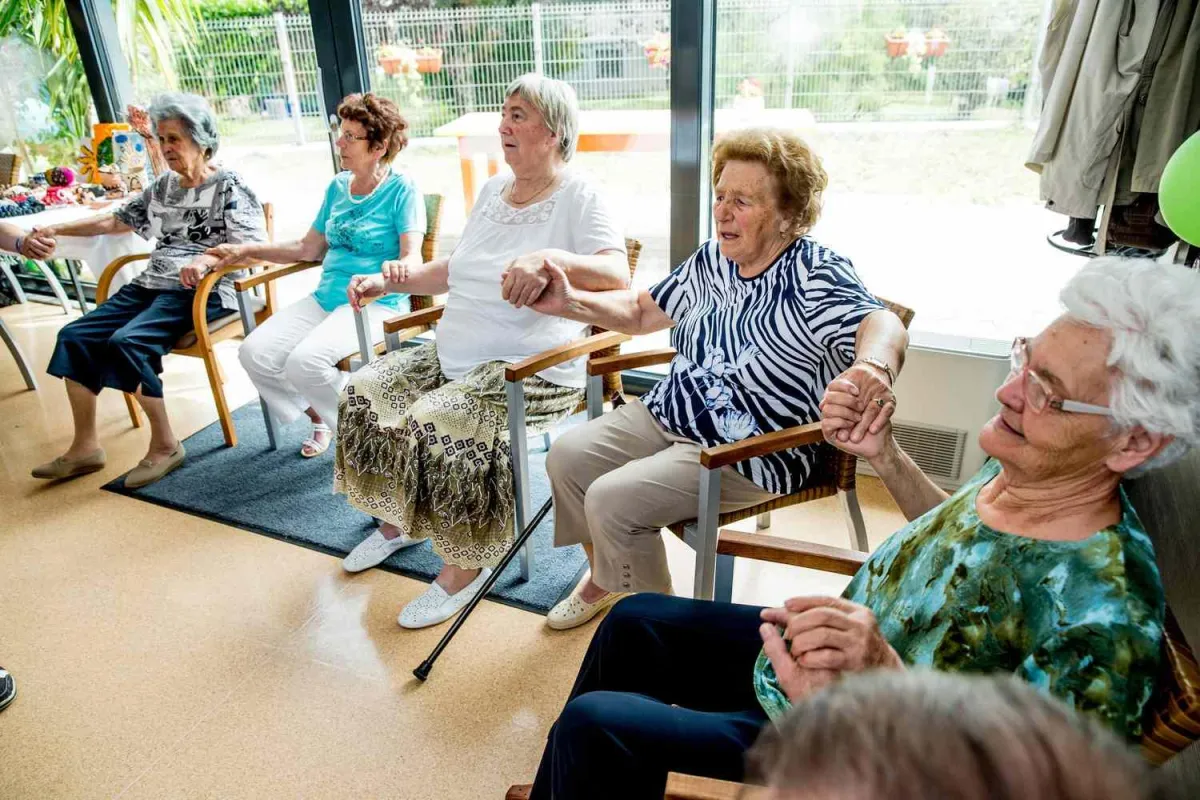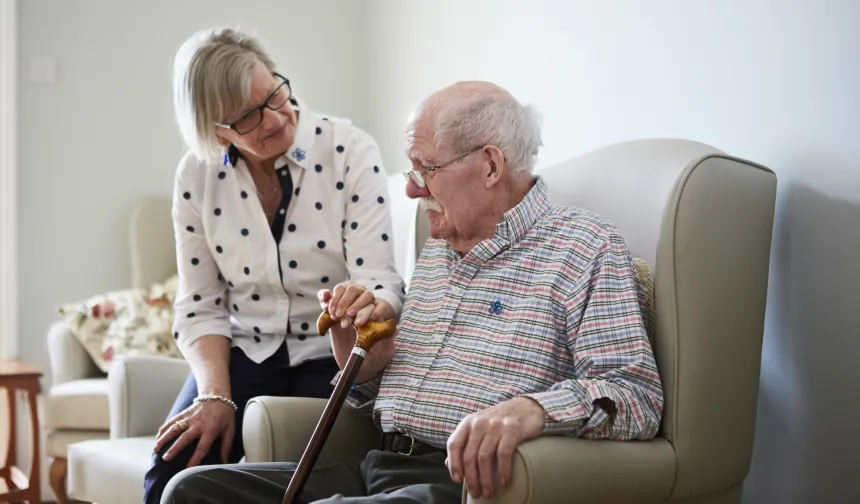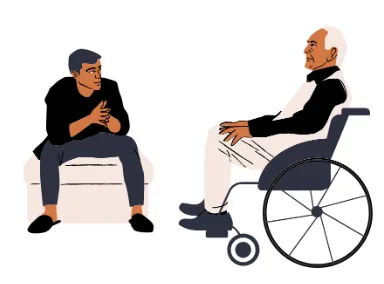Visit us: Mon - Fri: 9:00 - 18:30
Braley Care Homes 6192 US 60 Hurricane, WV 25526
Alzheimer’s Care
What is Alzheimer’s?
Alzheimer's disease is the most common type of dementia. It is a progressive disease beginning with mild memory loss and possibly leading to loss of the ability to carry on a conversation and respond to the environment. Alzheimer's disease involves parts of the brain that control thought, memory, and language.
What is Alzheimer’s?
Alzheimer's disease is the most common type of dementia. It is a progressive disease beginning with mild memory loss and possibly leading to loss of the ability to carry on a conversation and respond to the environment. Alzheimer's disease involves parts of the brain that control thought, memory, and language.
Alzheimer's Care: Compassionate Support for Your Loved Ones

Alzheimer's disease, the most common form of dementia, profoundly impacts memory, thought, and behavior. At Braley Care Homes, we understand the complexities of this progressive neurodegenerative disorder and are dedicated to providing compassionate, specialized care that enhances the quality of life for individuals living with Alzheimer's and offers peace of mind to their families.
In the United States, millions are affected by Alzheimer's, with significant emotional and financial costs. Our mission is to offer a supportive environment where residents receive personalized care, engaging activities, and the utmost respect and dignity. We focus on creating a safe, nurturing space that addresses the unique needs of each resident, promoting their well-being at every stage of the disease.
Braley Care Homes: West Virginia's Premier Alzheimer's Care Specialist
Braley Care Homes stands as a beacon of specialized Alzheimer's and dementia care in West Virginia. As the only standalone facility in the state dedicated exclusively to memory care, we offer a unique and unparalleled level of expertise and focus. Our singular mission is to provide a safe, nurturing, and stimulating environment tailored to the specific needs of individuals living with Alzheimer's disease and other forms of dementia. We pride ourselves on creating a community where residents can thrive, maintain their dignity, and experience a high quality of life, supported by a team deeply committed to compassionate and person-centered care.

Other risk factors

Family history

Age
Understanding Alzheimer's Disease
Alzheimer's disease is a progressive condition that affects parts of the brain controlling memory, thought, and language. It begins with mild memory loss and can eventually lead to a loss of the ability to communicate and respond to one's environment. While age and family history are known risk factors, ongoing research is exploring controllable factors that may help reduce the risk. Understanding the nuances of this disease is crucial for effective caregiving.
Caring for someone with Alzheimer's requires a comprehensive approach that includes medical support, psychological well-being, and assistance with daily living. Our team at Braley Care Homes is extensively trained to manage the evolving needs of individuals with Alzheimer's, ensuring they receive the best possible care, tailored to their unique journey.
Memory Care vs. Assisted Living
While many assisted living centers offer memory care services, these are distinct in their approach. Memory care, as provided at Braley Care Homes, is specifically designed for individuals with dementia, Alzheimer's, and other forms of memory impairment. Our memory care units are intentionally designed for easier navigation and feature 24/7 staff supervision to ensure resident safety, especially for those prone to wandering. This specialized design and constant oversight are critical for individuals with cognitive challenges.
Assisted living facilities can be suitable for individuals in the early to intermediate stages of dementia, offering a balance of independence and support. However, for those in later stages requiring constant medical attention and assistance with basic life functions, specialized memory care facilities like Braley Care Homes or nursing homes are often the most appropriate choice.
When You Should Consider Choosing Memory Care
There are certain activities that can reduce the development of dementia and these are services you will not usually find in a nursing home. For example, scientific study has shown that doing an outdoors walk at regular times of the day can help people struggling with dementia apart from the straightforward benefits of exercise. You’ll find that a nursing home might not be so open to that idea.
Music, which is usually found in all residential living rooms for the elderly, might not be so welcome to people with dementia. Memory care staff will have to approach and speak to a patient gently before requesting to play them any music despite the fact that it has been found to offer therapeutic benefits to people with Alzheimer’s.
Perhaps the fact that staff members at a memory care unit are better trained in caring and responding to dementia-related issues such as wandering or hostilities from the patient. The chances you’ll find staff trained specifically to help people with dementia working in a nursing home are not as high as staff members working in a memory care unit.
Every state has set in place rules stipulating how staff must be trained and experience for a certain amount of time before they are deemed qualified to engage a patient with dementia. Memory care centers give more assurance on this issue as compared to nursing homes because the staffers are better skilled at patience when communicating with patients with dementia or calming them down so they can receive to be administered medicine on the chance that they become aggressive.
Memory care centers are also designed for people with dementia. Subtle things such as brightly decorated or painted walls or allowance of natural light are therapeutic aspects for people living with dementia.
Choosing whether to make a memory care facility for an elderly loved one is a tough choice. Make sure that you consider the cost, accreditation of the facility, its location, and the services it offers.
Music, which is usually found in all residential living rooms for the elderly, might not be so welcome to people with dementia. Memory care staff will have to approach and speak to a patient gently before requesting to play them any music despite the fact that it has been found to offer therapeutic benefits to people with Alzheimer’s.
Types of Alzheimer's Care
Alzheimer's care can be tailored to the specific stage of the disease and individual needs. Braley Care Homes specializes in providing comprehensive care within our dedicated facility, but understanding the broader landscape is important:
In-Home Care
Many Alzheimer's patients prefer to stay in their familiar surroundings, and in-home care allows for personalized support in the comfort of the patient's home. Caregivers and family members, including 16 million family members who provided 18.5 billion hours of unpaid care in 2020 (Alzheimer's Association, 2020), often play a crucial role here. From daily activities to medical management, in-home care offers tailored assistance.


Adult Day Care Centers
For patients who need supervision and structured activities during the day, adult day care centers offer a valuable option. These facilities focus on cognitive stimulation, social interaction, and physical exercise, contributing positively to the patient's cognitive functioning.
Assisted Living Facilities
As Alzheimer's progresses, an assisted living facility with specialized Alzheimer's care may be appropriate. They provide a safe environment, regular routines, and professional staff trained in handling the confusion and disorientation common in Alzheimer's patients.


Memory Care Units
These are specialized sections within assisted living facilities or nursing homes exclusively designed for individuals with Alzheimer's or other dementias. They offer 24/7 supervision, structured activities, and therapies to maintain cognitive functioning.
Nursing Homes
For those in advanced stages of Alzheimer's, nursing homes offer intensive medical care and support. Staff trained in Alzheimer's care can address complex medical needs and offer end-of-life care.


Respite Care
Alzheimer's care can be demanding for caregivers. Respite care allows caregivers to take a break while ensuring that the patient continues to receive proper care. This can be in-home or at a facility for short-term stays.
Hospice Care
During the final stages of Alzheimer's, hospice care focuses on palliative treatment, emphasizing comfort and quality of life rather than cure.


Integrated Care Approach
Alzheimer's care is often most effective when it's a collaborative effort involving healthcare professionals, family members, and various care facilities. Regular routines, physical activity, nutrition, and medication are all tailored to individual needs, creating a comprehensive care strategy.
These types of care form a continuum that aligns with the progression of Alzheimer's disease. Selecting the appropriate type of care requires careful consideration of the patient's current needs, preferences, and available resources. With an estimated average cost of care being $56,800 per year (Alzheimer's Association, 2020), understanding these options is essential for both financial planning and ensuring that the patient receives the most suitable and compassionate Alzheimer's care. The goal is to foster dignity, independence, and the highest possible quality of life at every stage of this challenging journey.
When it comes to Alzheimer's care, understanding the various types available is essential to choose the best option for the patient. Alzheimer's disease progresses through stages, and the care needed varies accordingly. Here's an overview of the different types of Alzheimer's care that cater to the specific and evolving needs of those living with this condition.
Benefits of Specialized Memory Care at Braley Care Homes
Braley Care Homes offers specialized services that can significantly improve the lives of individuals with Alzheimer's and dementia. Our focused approach yields tangible benefits, often including:
Reduced instances of agitation and aggressive behaviors through understanding and specialized interventions.
Increased social interaction and engagement in tailored activities designed for cognitive stimulation.
Fewer falls and injuries due to our secure environment and vigilant staff.
Decreased need for emergency room visits through proactive health management.
Reduced reliance on certain medications by addressing behavioral and environmental triggers.
Our care services are meticulously structured to support cognitive function and overall well-being, incorporating tailored activities and professional guidance to manage memory loss effectively. We are committed to enhancing cognitive health and promoting a fulfilling life.

Personalized Care
Tailored to individual needs, symptoms, and preferences, ensuring each resident receives unique attention.

Safety and Security
Secure environments designed to prevent accidents and wandering, providing peace of mind for families.

Emotional Support
Fostering social interaction to combat isolation and depression, promoting a sense of community.

Enhanced Cognitive Functioning
Engaging activities and routines designed to maintain mental function and slow cognitive decline.

Respite for Family Caregivers
Providing essential breaks and support for family members navigating the challenges of caregiving.

Medical Management
Ensuring proper medication administration and health monitoring by trained professionals.
Who Provides Alzheimer's Care?
A collaborative team ensures comprehensive Alzheimer's care. At Braley Care Homes, our dedicated team works in concert with external medical professionals to provide the highest standard of care:
Geriatricians: Specialized in elderly care, they oversee the general medical needs of the patient.
Neurologists: Focus on the brain and nervous system, contributing to the understanding and treatment of Alzheimer's disease.
Psychiatrists and Psychologists: Provide mental health support, helping with symptoms such as depression or anxiety.
Pharmacists: Assist with medication management to slow down Alzheimer's
Nurses and Nurse Practitioners
Offer regular medical care and support, monitor the patient's health, and administer medications. Occupational and Physical Therapists: Work to maintain or improve the patient's physical abilities. Physical activity like walking can boost cognitive functioning.
Dietitians: Specialized in nutrition, they help in maintaining cognitive functioning and overall physical health by developing a diet that meets the patient's unique needs.
Professional Caregivers
Trained to provide Alzheimer's care, they assist with daily activities and ensure the patient's safety, creating an environment that minimizes confusion and disorientation.
Family Members and Unpaid Caregivers:
Often the primary caregivers, they provide emotional support, help with daily tasks, and collaborate with professionals to ensure continuity in care. In 2020, family caregivers provided 18.5 billion hours of unpaid care valued at $244 billion (Alzheimer's Association, 2020).
Social Workers
Support both patients and families in accessing resources, navigating medical systems, and providing counseling and emotional support.
Alzheimer's Care Facilities: The Braley Care Homes Difference
Our specialized memory care facility at Braley Care Homes is designed to provide a safe, structured, and nurturing environment that is second to none. Key features that set us apart include:
Safety Measures: Secured areas, clear signage, and a thoughtfully designed layout that aids orientation and prevents wandering.
Structured Routines: Predictable schedules that offer comfort, security, and reduce anxiety for residents.
Engaging Activities: Tailored programs designed to stimulate cognitive function, promote social interaction, and foster a sense of purpose.
Professional Staff: Our dedicated caregivers are specifically trained and experienced in dementia and Alzheimer's care, providing compassionate support 24/7.
Nutritional Support: Balanced and appealing meals are provided to support overall health and cognitive function.
Focus on Quality of Life: We prioritize respecting dignity, promoting independence, and honoring personal preferences in all aspects of care.
Alzheimer's Care at Home

Providing care at home is a viable option for many families. It allows for individualized care and promotes a comforting environment. In 2020, an estimated 16 million family members and other unpaid caregivers provided 18.5 billion hours of unpaid care valued at $244 billion (Alzheimer's Association, 2020).
Caring for a loved one with Alzheimer's at home can be both a rewarding and challenging experience. Alzheimer's care at home allows for more personal, one-on-one attention, preserving the patient's routine and remaining in a familiar environment. Here's an overview of the essential components of Alzheimer's care at home:
Safety Considerations
Alzheimer's care facilities prioritize safety to minimize confusion and disorientation. This includes secured areas to prevent wandering, clear signage, and a layout that helps with orientation.
Structured Routine
Regular routine and structured activities provide comfort and security to residents. Activities are designed to engage residents and maintain cognitive function, such as arts and crafts, music therapy, and social gatherings.
Professional Staff
These facilities employ a team of healthcare professionals that is integral to Alzheimer's care, from medical experts to trained caregivers, all working to create an individualized care plan.
Nutritional Care
Dietitians work to ensure proper nutrition, which is vital for maintaining cognitive functioning and physical health.
Social Interaction: Facilitating social interaction is a key component, helping to reduce feelings of isolation and depression. Group activities, family visits, and one-on-one interactions are encouraged.
Physical Activity
Tailored physical activities such as walking are provided, as they can enhance cognitive functioning.
Cost Considerations
The average cost of care for a person with Alzheimer's or other dementias in these facilities is estimated to be $56,800 per year (Alzheimer's Association, 2020). Financial planning and assistance may be necessary.
Quality of Life
A focus on the overall quality of life, considering personal preferences and maintaining dignity and respect, is paramount. This includes personalizing rooms, honoring daily routines, and allowing choices whenever possible.
Family Involvement
Family members remain an essential part of the care team, visiting regularly and participating in care planning. Their insights and emotional support are vital.
Regulations and Standards
Quality care requires adherence to regulations and standards specific to dementia care. Regular inspections, proper licensing, and professional certifications ensure that the facility meets the required guidelines.
When to Consider Memory Care at Braley Care Homes
Choosing memory care is a significant decision. Consider Braley Care Homes when an individual's needs exceed what can be safely and effectively managed at home or in a standard assisted living setting. Key indicators include:
Increased safety concerns, such as wandering or falls, requiring constant supervision.
Difficulty with daily living activities (dressing, bathing, eating) that necessitate specialized assistance.
Significant changes in behavior, mood, or personality that impact well-being and safety.
The need for specialized therapeutic activities and constant supervision that only a dedicated memory care facility can provide.
Our memory care environments are designed with therapeutic elements like bright colors and natural light, which can be beneficial for individuals with dementia. Our staff members are specifically trained to handle dementia-related behaviors with patience, empathy, and expertise, ensuring a supportive and understanding atmosphere.

Cost of Care
The average cost of care for a person with Alzheimer's or other dementias is estimated to be $56,800 per year (Alzheimer's Association, 2020). Costs vary based on the type and level of care, geographic location, and specific needs of the individual.

Care Facilities and Home Care Costs
Different types of care facilities and home care options come with different price tags. Specialized Alzheimer's care facilities may have higher costs, while home care could be less expensive but may require additional modifications and professional assistance.

Medication and Treatment Costs
Medication to slow the progression of Alzheimer's and manage symptoms can be an additional expense. Other medical treatments, therapies, and regular medical check-ups should be factored in.

Insurance Considerations
Health insurance, long-term care insurance, and Medicare/Medicaid may cover certain aspects of Alzheimer's care, but coverage varies. It is essential to review policies, consult with experts, and understand exactly what is covered.

Government Assistance
Some federal and state programs may provide financial assistance for Alzheimer's care, especially for those with limited resources. Researching and applying for these programs can help alleviate financial burdens.

Financial Planning and Legal Considerations
Early financial planning is key. Consultation with a financial planner who is familiar with dementia care can help families navigate complicated financial landscapes. Legal matters such as power of attorney and living wills should also be addressed.

Family Contributions
Families often contribute to the cost of care, both through direct financial support and unpaid caregiving hours. In 2020, an estimated 16 million family members provided 18.5 billion hours of unpaid care valued at $244 billion (Alzheimer's Association, 2020).

Indirect Costs
There may also be indirect costs related to Alzheimer's care, such as lost wages for family caregivers, travel expenses, and more.

Future Cost Projections
As the disease progresses, care needs will change, and costs may increase. Future planning should consider the potential escalation in care needs and corresponding financial considerations.
In 2020, Alzheimer's and other dementias cost the United States an estimated $355 billion (Alzheimer's Association, 2020), illustrating the significant financial impact of the disease. Understanding and planning for the financial aspects of Alzheimer's care is essential to ensure that the best care is accessible and sustainable over the long term.
Thoughtful planning, consultation with experts, and exploration of various support resources can help families manage the financial challenges of Alzheimer's care
Alzheimer's Care and Quality of Life
Enhancing the quality of life for Alzheimer's patients is a core goal of care. This includes creating a safe environment, encouraging physical activity, fostering social interactions, and proper nutrition, all tailored to the individual's needs.
Quality of life for a person living with Alzheimer's disease is a multifaceted consideration that involves physical, mental, social, and emotional well-being. Proper Alzheimer's care plays a vital role in maintaining and even improving the quality of life for both the patient and their caregivers. Here's how different aspects of Alzheimer's care contribute to this goal:
Tailored Care Approach
Alzheimer's care must be tailored to the individual needs of the patient. Personalized care ensures that the unique preferences, habits, and needs of each patient are met, enhancing their comfort and overall well-being.
Safe Environment Creation
Creating a safe environment is vital, as Alzheimer's can cause confusion and disorientation. Ensuring safety measures are in place, like proper lighting and secured hazardous items, helps the patient feel secure and avoids unnecessary accidents.
Routine and Structure
Regular routine and structure can help the patient feel more secure and comfortable. Familiarity and predictability can ease anxiety and promote a sense of stability in daily life.
Physical Activity
Physical activities, such as walking, can help improve cognitive functioning. Engaging in regular, suitable exercises contributes to overall health and can boost mood and energy levels.
Social Interaction
Encouraging social interaction is crucial, as it can help reduce feelings of isolation and depression. Activities, hobbies, and time spent with family and friends can foster a sense of connection and joy.
Nutrition and Dietary Needs
Proper nutrition is vital for maintaining cognitive functioning and physical health. Alzheimer's patients often have specific dietary needs, and attention to these can have a significant positive impact on overall well-being.
Emotional Support from Caregivers and Family
Caregivers and family members are a critical part of the care team, providing emotional support and helping with daily activities. Their ongoing involvement and compassion can enhance the emotional well-being of the person with Alzheimer's.
Medication Management
Timely administration of medications to slow the progression of Alzheimer's and reduce symptoms can improve the quality of life. Medication management ensures that the right medicines are taken at the right times.
Respecting Dignity and Independence
Fostering a sense of autonomy and respecting the dignity of the patient is essential. Even simple choices in daily activities can make a difference in how the person with Alzheimer's perceives their value and control.
Addressing Co-existing Health Conditions
Many individuals with Alzheimer's have other chronic health conditions. Coordinated care to manage these conditions is necessary to optimize overall health and comfort.
Access to Support Services
Various support services, including counseling and respite care, can provide additional resources to enhance the quality of life for both patients and caregivers.
Alzheimer's care is a complex and continuous process that demands attentiveness, empathy, and skill. The focus on the individual and their comprehensive well-being contributes to a better quality of life. By considering all aspects of a person's needs, from physical health to emotional connections, Alzheimer's care can transform the experience of living with this challenging disease into a journey filled with dignity, respect, and love.
When You Should Consider Choosing Memory Care
There are certain activities that can reduce the development of dementia and these are services you will not usually find in a nursing home. For example, scientific study has shown that doing an outdoors walk at regular times of the day can help people struggling with dementia apart from the straightforward benefits of exercise. You’ll find that a nursing home might not be so open to that idea.
Music, which is usually found in all residential living rooms for the elderly, might not be so welcome to people with dementia. Memory care staff will have to approach and speak to a patient gently before requesting to play them any music despite the fact that it has been found to offer therapeutic benefits to people with Alzheimer’s.
Perhaps the fact that staff members at a memory care unit are better trained in caring and responding to dementia-related issues such as wandering or hostilities from the patient. The chances you’ll find staff trained specifically to help people with dementia working in a nursing home are not as high as staff members working in a memory care unit.
Every state has set in place rules stipulating how staff must be trained and experience for a certain amount of time before they are deemed qualified to engage a patient with dementia. Memory care centers give more assurance on this issue as compared to nursing homes because the staffers are better skilled at patience when communicating with patients with dementia or calming them down so they can receive to be administered medicine on the chance that they become aggressive.
Memory care centers are also designed for people with dementia. Subtle things such as brightly decorated or painted walls or allowance of natural light are therapeutic aspects for people living with dementia.
Choosing whether to make a memory care facility for an elderly loved one is a tough choice. Make sure that you consider the cost, accreditation of the facility, its location, and the services it offers.
Music, which is usually found in all residential living rooms for the elderly, might not be so welcome to people with dementia. Memory care staff will have to approach and speak to a patient gently before requesting to play them any music despite the fact that it has been found to offer therapeutic benefits to people with Alzheimer’s.
Contact Us to Schedule a Tour!
Surrounding areas we serve.
Hurricane, WV
Charleston, WV
Huntington, WV
Dunbar, WV
St. Albans, WV
CONTACT US
Location:
Braley Care Homes
6192 US-60
Hurricane, WV 25526
Phone Numbers:
Referrals and Inquiries: (304) 767-4033
Facility Phone: (304) 201-3677
Facility Fax: (304) 201-3678
AREAS WE SERVE
BUSINESS HOURS
Monday
9:00am – 6:30pm
Tuesday
9:00am – 6:30pm
Wednesday
9:00am – 6:30pm
Thursday
9:00am – 6:30pm
Friday
9:00am – 6:30pm
Contact Us to
Schedule a Tour!

Our clinic largest private mental health partnership, with a carefully selected nationwide team of Psychiatrists.
KEEP IN TOUCH.
CONTACT US
Location:
Braley Care Homes
6192 US 60
Hurricane, WV 25526
Phone Numbers:
Referrals and Inquiries: (304) 767-4033
Facility Phone: (304) 201-3677
Facility Fax: (304) 201-3678
AREAS WE SERVE
BUSINESS HOURS
Monday
9:00am – 6:30pm
Tuesday
9:00am – 6:30pm
Wednesday
9:00am – 6:30pm
Thursday
9:00am – 6:30pm
Friday
9:00am – 6:30pm



